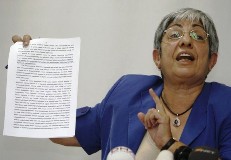
As the murder trial continues this week in Turkey, the investigation remains far from complete. Jo Glanville spoke to Dink family lawyer Fethiye Çetin about the case
The sixth hearing in the Hrant Dink murder trial takes place in Istanbul today. It is 18 months since the Armenian-Turkish editor and journalist was shot dead outside the office of his newspaper Agos — and a year since the trial of his 17-year-old murderer, Ogün Samast, and 18 alleged accomplices, began. Dink’s lawyers are so concerned at the conduct of the investigation that they have taken the case to the European Court.
Dink was one of Turkey’s bravest voices. He was twice prosecuted under the infamous Article 301 of Turkey’s penal code for ‘insulting Turkishness’. In his attempt to forge a fully democratic Turkey, a nation that gives equal space to all its minorities, he felt it was imperative for the country to confront the truth of its past and he openly discussed the taboo of the Armenian genocide in 1915. He was also a strong advocate of Turkey’s bid to join the EU.
‘The very fact that Hrant Dink was chosen to be murdered was a well planned, well thought out idea,’ says Fethiye Çetin, who defended Dink when he was prosecuted and now represents his family. ‘First — he was a truly democratic person. Second — he was Armenian and he was outspoken. By being democratic, Armenian and outspoken, he was touching quite clearly and openly on those taboos the deep state did not want exposed or talked about.’
The idea of the ‘deep state’ goes to the heart of Turkey’s troubles. It describes the anti-democratic forces that may undermine any government that is considered to deviate from the Kemalist path. Since the trial began, the climate in Turkey has become even more volatile as the legitimacy of the AKP government is challenged in the courts and the detention of 21 people last week alleged to be connected to the ultra-nationalist network Ergenekon.
It is very possible that the Ergenekon case could cast light on the murder of Dink or, at the very least, on the hate campaign which led up to his death. Amongst those detained earlier this year, some were active participants in the demonstrations against Dink that took place during the prosecutions under 301. ‘This [murder] trial is like a mirror for Turkey,’ says Fethiye Çetin. ‘In the end, either those who say “No” to what is going on are going to win and everything is going to change — or nothing is going to change.’
When Ogün Samast was arrested, he was filmed on a mobile phone being feted at the local police station. It is the collusion of the local police and the civil security forces that Fethiye Çetin wants to see exposed.
‘Right from the beginning, we noticed and realised that both the gendarmes and the civil security forces were very much aware of the murder — and not only aware of the murder, but of very detailed plans as well. Because we were aware of that from the very beginning, we wanted the trial to be looked at from that point of view. Through an efficient, effective, investigation, we wanted those in charge, on duty, in the gendarmes and the civil society, to be tried, but we have failed so far.’
Although junior officers in Trabzon have admitted that they knew about the plot, senior officers have not been cross-examined and only an internal investigation has taken place. ‘We’ve been saying right from the start that an internal investigation should be out of the question — because this is a murder trial. In these cases, the prosecutors should initiate an investigation.’
Fethiye Çetin’s memoir, My Grandmother, has just been published by Verso
Read Maureen Freely’s article ‘Why They Killed Hrant Dink’ from Index on Censorship May 2007




